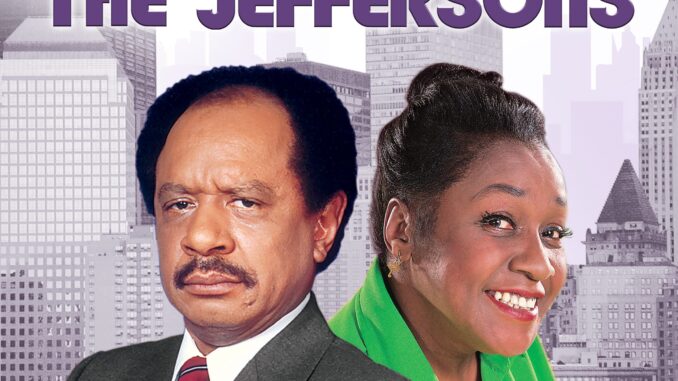
Remembering Norman Lear, creator of ‘All in the Family’ and ‘The Jeffersons’
Lear, who died Dec. 5, used humor to address racism and politics. Terry Gross spoke with Lear in 2014; Good Times actor Esther Rolle in 1983; and All in the Family director John Rich in 2006.
This is FRESH AIR. I’m David Bianculli. Today’s show is devoted to Norman Lear, the sitcom producer who helped transform television of the 1970s by stressing topicality, divisive issues and likeable but volatile comedy characters. He died last week at age 101. Lear’s most famous achievement, “All In The Family,” was the most popular series on TV for five consecutive years. That show spawned several hit spinoffs, including “Good Times” and “The Jeffersons,” and Lear created many other comedies, as well. Most of them were instant successes, but even the lesser-seen cult shows were fascinating. On today’s show, we’ll listen back to our interview with Norman Lear. We’ll also revisit interviews with Esther Rolle, the star of “Good Times” and John Rich, who directed one episode of “Good Times” and 81 episodes of “All In The Family.”
But first, let’s put Norman Lear’s legacy in its proper perspective. Like MTM Enterprises with “The Mary Tyler Moore Show” and Larry Gelbart with “M*A*S*H,” Lear was a TV pioneer of sorts. Part of a new tolerance and appetite for comedies that actually said something rather than just offered total escapism. Lear adapted his first sitcom hit, “All In The Family,” from a long-running British sitcom called “Till Death Us Do Part.” But Lear made his version utterly American from the start. The first episode of “All In The Family” was so controversial it was preceded by an on-air disclaimer. But the clash of ideas and ideals between bigoted Archie Bunker and his son-in-law, whom Archie called Meathead, caught on instantly. And by the third season, the show was so successful it found a way to feature Rat Pack superstar Sammy Davis Jr., who played himself having a conversation about race with Archie played with perfect timing and delivery by Carroll O’Connor.
(SOUNDBITE OF TV SHOW, “ALL IN THE FAMILY”)
CARROLL O’CONNOR: (As Archie Bunker) Now, no prejudice intended, but, you know, I always check with the Bible on these here things.
SAMMY DAVIS JR.: (As Self) Oh.
O’CONNOR: (As Archie Bunker) Yeah. I think that – I mean, if God had meant us to be together, he’d have put us together. Well, look what he’d done. He put you over in Africa. He put the rest of us in all the white countries.
BIANCULLI: The many successes of Norman Lear are well known, and such shows as “Sanford And Son,” “Good Times” and “The Jeffersons” were not only popular, but groundbreaking, by giving leading roles to gifted, Black actors. But I’m equally fascinated by the lesser-known, cultish TV experiments on Lear’s resume. “Mary Hartman, Mary Hartman,” for example, was a brilliant, deadpan satire of soap operas set in the small, fictional town of Fernwood, Ohio. And it, too, spawned a spinoff, “Fernwood Tonight,” a spoof of a local TV talk show that was the spiritual ancestor of Garry Shandling’s “The Larry Sanders Show,” which would appear a generation later. “Fernwood Tonight” starred Martin Mull as smarmy talk show host Barth Gimble and the great Fred Willard as Barth’s announcer, an amazingly clueless sidekick, Jerry Hubbard. In this clip, after the theme music, they’re interviewing a World War II vet.
(SOUNDBITE OF TV SHOW, “FERNWOOD TONIGHT”)
FRED WILLARD: (As Jerry Hubbard) Tonight from Fernwood, Fernwood Tonight. Coming to you live with your host for tonight, Mr. Barth Gimble.
MARTIN MULL: (As Barth Gimble) And cut and hurt. And you were smart, being careful.
UNIDENTIFIED ACTOR: (As Character) Darn right. Yeah.
WILLARD: (As Jerry Hubbard) World War II. You know, it’s funny. Back then, it was legal to kill a German. But, boy, if you kill one now, all hell breaks loose.
(LAUGHTER)
BIANCULLI: Most esoteric of all, perhaps, was Lear’s concept for a gender switching 1977 comedy called “All That Glitters.” Shot without a laugh track, its premise was that stereotypical roles in society have been reversed – women ran corporations and law firms, and men were secretaries and house husbands. Here’s a scene from the rarely seen pilot, with an unmarried couple snuggling in bed at the start of a workday. Louise Shaffer plays the woman, Gary Sandy, later to star in “WKRP In Cincinnati,” plays the man.
(SOUNDBITE OF TV SHOW, “ALL THAT GLITTERS”)
LOUISE SHAFFER: (As Andrea Martin) You know something? You are a very unusual guy.
GARY SANDY: (As Dan Kincaid) Oh, yeah.
SHAFFER: (As Andrea Martin) I bet if you wanted to, you could be a hell of a lot more than just a secretary. There’s got to be some kind of executive job for a bright, inquisitive, capable guy.
SANDY: (As Dan Kincaid) Sorry, it’s not in my plans. All I want is you, a home of my own, a
